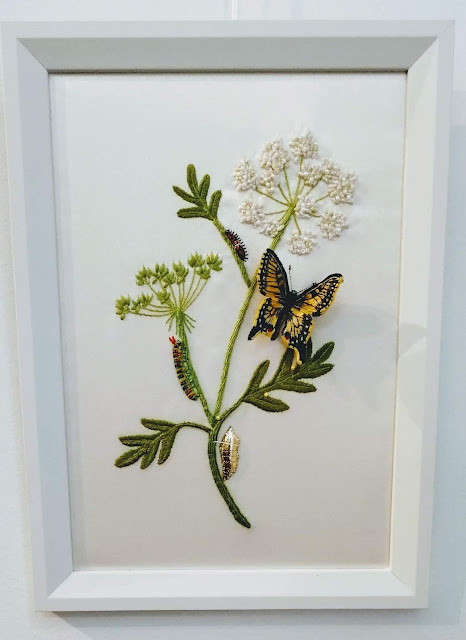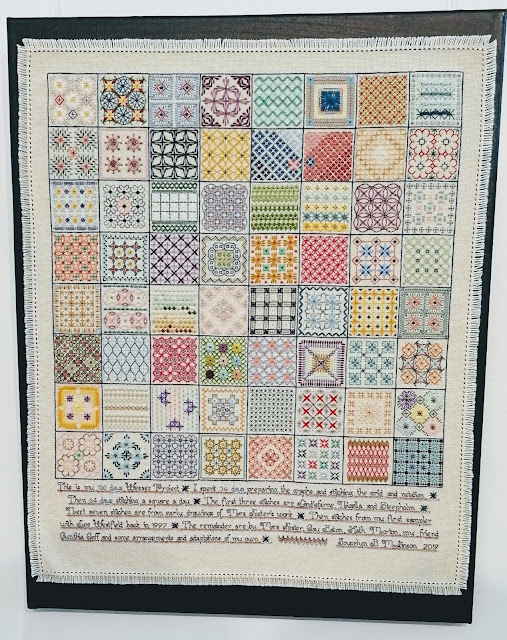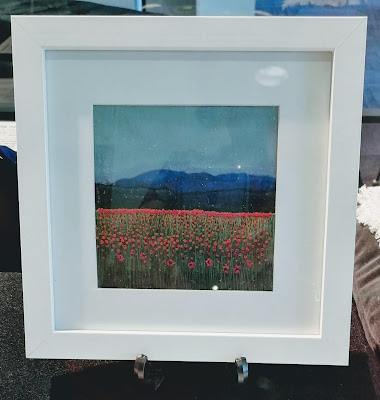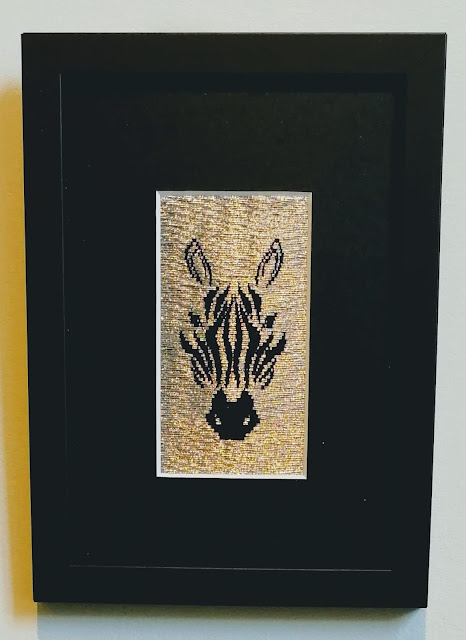I have included the statements that accompanied each of the embroideries which also explain the embroidery technique used.
The prize winners
I am pretty sure I didn't photograph all of the prize winners but here are the ones that particularly interested me.
Lynette Hale - 17th Century Gentleman's Sleeping Cap
Selectors Choice Noeline McIlroy Prize and Viewer's Choice Second Place
Lynette posted this to Facebook "This is an embroidered mans’ 17th century sleeping cap which I did a while ago. I also made the metallic bobbin lace trim. Last night at the Canterbury Embroiderers Guild Exhibition opening I was honoured by being presented with the late Noelene McIlroy award for best stitching by the selectors. Very thrilled & did not sleep a wink last night!"Artist's statement: Modern interpretation of a 17th century design by Thomas Trevelyon. Worked in pure silk, metallic threads, beads and sequins. The bobbin lace is worked in gold thread. The cap is lined with silk brocade and finished with a handmade silk tassel.
Category: Traditional
Design source: Thomas Trevelyon
Technique: Surface stitchery and goldwork
Surface stitchery is any form of freestyle embroidery in which the pattern is worked by the use of decorative stitches and laid threads.
Goldwork originating in Asia, is the art of embroidery using metal threads. Once accessible only to the wealthy, goldwork embroidery was used historically to adorn ecclesiastical textiles, military uniforms, and clothing and textiles of the nobility. It is a type of surface embroidery and the majority is a form of laid work or couching that is, the gold threads are held on the the surface of the fabric by a second thread, usually of fine silk. The ends of the thread, depending on type are simply cut off, or are pulled through to the back of the embroidery and carefully secured with the couching thread. A tool called a mellore or a stiletto is used to help position the threads and create the holes needed to pull them through.
Louise McCliskie - A Couple of Dusty Millers
Best Embroidery Traditional Embroidery Original Design
Artist's statement: Dusty Miller annuals are known for their velvety, silver foliage. These two stumpwork pieces recreate the Dusty Miller beautifully.
Category: Traditional
Design source: Original
Technique: Stumpwork
Category: Traditional
Design source: Original
Technique: Stumpwork
Stumpwork or raised work is a style of embroidery in which stitching is raised from the surface of the work to form a three-dimensional effect. Stitches can be padded or worked around pieces of wire to create individual forms such as leaves, insect wings or flower petals.
This pair of embroideries were completely stunning the leaves recreated the velvety texture amazingly well.
Linda Graham - Sublime Stitches
Best Embroidery Traditional Embroidery Class or Kit Design
Artist's statement: A collection of stitches in a sampler form. This beautifully stitched piece is a modern take on the traditional sampler.Category: Traditional
Design source: Elizabeth Almond, Blackwork Journey
Technique: Needlework sampler
A Needlework Sampler is a piece of embroidery or cross-stitching produced as a specimen of achievement, demonstration or a test of a skill in needlework. It often includes the alphabet, figures, motifs, decorative borders and sometimes the name of the person who embroidered it and the date.
Not sure why but there are some strange goings on in the photo at the bottom left and right hand corners where the embroidery is duplicated over the borders. Hopefully it doesn't detract too much from this gorgeous sampler.
Kate Paterson - Le Danseur
Best Embroidery Contemporary Embroidery Class or Kit Design
Artist's statement: Stitched from a kit I purchased in Paris at the haberdashery shop Au Ver a Soie (Silk House). The instructions were in French with excellent diagrams!Category: Contemporary
Design source: Pascal Jaouen and Mik Jegou
Technique: Surface stitchery
The ones that caught my eye
I could easily have photographed many more of the pieces as this was a very inspiring exhibition, however I chose to photograph only those that really spoke to me. For example when I received the email with the viewer's choice winners I realised that I hadn't taken a picture of the piece that won first place.
Jenny Baird - We Are One
Artist's statement: Design created following the Christchurch Mosque attacks interpreted in stitch.
Category: Contemporary
Design source: Ruby Jones
Technique: Surface stitchery
Category: Contemporary
Design source: Ruby Jones
Technique: Surface stitchery
Jenny Baird - Forbidden Fruit
Artist's statement: One of William Morris's most popular designs. The Strawberry Thief, stitched in crewel and beadwork. Resplendent in plumage of floral patterns this cheeky fellow looks very pleased with his juicy red prize.
Category: Traditional
Design source: Nicola Jarvis, Inspirations Magazine issue 93
Technique: Surface stitchery
Category: Traditional
Design source: Nicola Jarvis, Inspirations Magazine issue 93
Technique: Surface stitchery
Crystine Baxter - La Broderie au Passe
Artist's statement: Interpretation of an historic design worked in surface stitchery.
Category: Traditional
Design source: Thérèse de Dillmont
Technique: Surface stitchery
Category: Traditional
Design source: Thérèse de Dillmont
Technique: Surface stitchery
Dawn Chivers - A Partridge in a Pear Tree
Artist's statement: Surface stitchery using one strand of thread.
Category: Contemporary
Design source: Jill Buckley / Trish Burr
Technique: Surface stitchery
Dawn Chivers - The Life Cycle of the Swallowtail Butterfly
Artist's statement: Stumpwork using a single strand of silk creates this depiction of the butterfly life cycle.Category: Traditional
Design source: Jane Nicholas Embroidery
Technique: Stumpwork
Maree Cooper - Christmas Tree
Artist's statement: Cross stitch Christmas tree embellished with beads.Category: Traditional
Design source: Cynthia Zittel, The Drawn Thread
Technique: Cross stitch
Cross stitch: a counted stitch commonly worked on evenweave fabric such as linen. Cross stitch is one of the oldest and most popular embroidery stitches, historically it was used to adorn clothing and household linens and is now commonly used to create decorative pictures.
Linda Graham - Quaker Cross Stitch Balls
Artist's statement: Cross stitch used in a fascinating way to use up left over fabric and threads.Category: Traditional
Design source: Denise Harrington Pratt of Amaryllis Artworks (Facebook page)
Technique: Quaker embroidery
Quaker embroidery: the Religious Society of Friends, or Quakers, believed in the importance of education for girls including the teaching of embroidery. Motifs associated with Quaker instruction include: Roman style alphabet, small wreaths, paired doves, swans, natural looking sprays of flowers, and eight-pointed stars. Unique to Quaker samplers was the inclusion of bold and intricate medallions and half medallions, often lined up along the edge as a border. Widespread adoption of the same alphabets and motifs led to nineteenth century samplers that are easily recognisable as having been created under the instruction of a Quaker teacher or one trained in a Quaker school. These motifs are now being used to create cross stitch patterns which are used in decorative work.
Carolyn Lynn - Butterfly Courtship
Category: Contemporary
Design source: Papillon Paisley Butterflies by Hayley Crouse for Michael Miller Fabrics
Technique: Surface stitchery
Lyn Mallinson - My 100 Day Project
Artist's statement: This piece is, to a certain extent, self-explanatory; a 100 day challenge. Although I had prepared graphs they did not always work out as I had planned. Sometimes it was because of the colours used, or the colour I wanted to use, sometimes two patterns just didn't look right together. Positions were changed which caused others to be changed too. So strictly speaking not a 100 day challenge but it certainly threw up lots of challenges and it did take 100 days to complete - plus one more to make it presentable!Worked on 28 count even weave fabric using a combination of Perle 8 and DMC Flower Thread which unfortunately is no longer available.
Category: Contemporary
Design source: Original
Technique: Wessex stitchery
I bumped into Lyn at the exhibition and we discussed her 100 day project. The original concept was to draw a 10 x 10 grid, have a basket of stitch technique names which you randomly pull out and stitch in one of the grid squares. Once you have used all of the stitch techniques you put them all back in the basket and start again. This resulted in a very random look which didn't bring Lyn joy. So on the advice of her daughter she threw away the sampler in progress to create her own version of the challenge using Wessex stitchery, a technique very dear to Lyn's heart, and an 8 x 8 grid. This version is more suited to the precision Lyn likes to demonstrate in her work. Lyn is a fabulous tutor and this sampler is a great example of her design aesthetic.
Karen McElhinney - Toowit Toowoo
Artist's statement: Two owls sitting on a branch - a contemporary take on traditional goldwork embroidery.Category: Contemporary
Design Source: AnneMarie Moorhead class at the Wanaka Embroidery School
Technique: Goldwork
Jeanne Moeller - Christmas Tree
Artist's statement: Velvet material decorated with surface stitchery and embellishments.
Category: Contemporary
Design source: Jane van Keulen (Stash Palace)
Technique: Surface stitchery
Laura Murray - Poppies
Artist's statement: Surface embroidery on layered fabric which has been used to give dimension and perspective.Category: Contemporary
Design source: Anne Jaquiery-Newall, Nelson Embroidery School 2018
Technique: Surface stitchery
Colleen Parrish - Friends
Artist's statement: Design created following the Christchurch Mosque attacks interpreted in stitch.Category: Contemporary
Design source: Ruby Jones
Technique: Surface stitchery
Colleen Parrish - Scruffy the Blackbird
Artist's statement: Cushion printed with a photo of a blackbird embellished with stitch.Category: Contemporary
Design source: Original
Technique: Surface stitchery
Colleen Parrish - Thread Painted Bird
Artist's statement: Long and short stitches using one strand of thread to recreate this picture of an African Lilac Crested Roller.Category: Contemporary
Design source: Savanna Glory by Renette Kumm (@RenetteKumm), Inspirations Magazine issue 95
Technique: Thread painting
Thread painting: also called needle painting, is an approach that uses a combination of long and short stitches and a variety of colours to produce embroidery that has the same qualities of a painting.
Leureen Pedersen - Zebra
Artist's statement: Or Nue technique has been used to great effect to create this stunning zebra.Category: Contemporary
Design source: Anne Jaquiery-Newall
Technique: Or Nue
Or Nue (or shaded gold) is a form of goldwork embroidery using couching where different coloured silk threads are stitched over the metallic base of gold threads to form patterns or designs.
Alison Wilson - Spray of Ginko Leaves
Viewer's Choice 3rd Place
Artist's statement: Traditional goldwork and needle painting used to create a decorative picture.Category: Traditional
Design source: Shirley Pygott
Technique: Goldwork and needle painting
Alison Wilson - Turkish Tile
Artist's statement: Canvas work tile
Category: Traditional
Design source: Shirley Pygott
Technique: Canvas work
Canvas work is a form of counted work stitched on an even, openly woven canvas. A large variety of stitches are used to create a pattern which can vary depending on materials used, texture and scale.
Category: Traditional
Design source: Shirley Pygott
Technique: Canvas work
Canvas work is a form of counted work stitched on an even, openly woven canvas. A large variety of stitches are used to create a pattern which can vary depending on materials used, texture and scale.
Diane Wilson - Terracotta Tile
Artist's statement: Terracotta inspired tile in canvas work stitches, embellished with beads and metal threads.Category: Traditional
Design source: Merrilyn Heazlewood
Technique: Canvas work
The guest exhibitor - Jo Dixey @dixeysoul
In Jo's own words "I am a freelance embroiderer, stitch artist and author of the embroidery book Creative Thread. I teach small groups a variety of embroidery and fabric techniques as well as design based workshops. I work on commissions which have included large alter cloths, university banners and work for the fashion and movie industries. I repair old embroideries and I hold exhibitions of my own work. The work I do for exhibition ranges from large wall hung quilts to fine embroideries. These pieces are mostly based on the human form and often comment on life!I trained for three years at the Royal School of Needlework, followed by City and Guilds creative embroidery parts one and two. I worked for the Embroiderers Guild in the UK for a year promoting embroidery around the country before moving to New Zealand in 2000."
Jo in the past (before Instagram) had a blog at http://dixeysoul.blogspot.com/
Oh you wear glasses numbers 1 to 5, 20 x 25 cm
In closing
Lyn Mallinson, one of the exhibition selectors wrote a really nice piece in the Guild newsletter. "Congratulations to all our exhibitors. What a great variety of styles and abilities. Well done to those of you who submitted original pieces – keep up the good work. But by far the biggest section was the “work from kit, graph or class” so another thank you to Ann for including these groups. The hardest part was choosing the prizes! There were so many worthy of commendation. We could have awarded more prizes as several of you missed “by the skin of your teeth”. We have had a lot of positive feedback from both the public and the Museum staff. This shows what a great Exhibition we have had and you may all feel justifiably satisfied with your achievements. You did our Guild proud."I second Lyn's words the exhibition was a truly splendid look inside the workroom of Guild members and the fantastic embroidery they can achieve. Hopefully the inspiration I soaked up will last long enough for me to pick up needle and thread to finish a goldwork piece I started in a class earlier this year, which is currently languishing on the sofa.
And...
I won one of the raffle prizes (the Blue Raffle) full of delicious comestible goodies.
Thanks to Ann Bradley and her team for putting on such a wonderful exhibition, and to Ann Bradley personally for the delivery of my raffle prize.



























No comments:
Post a Comment